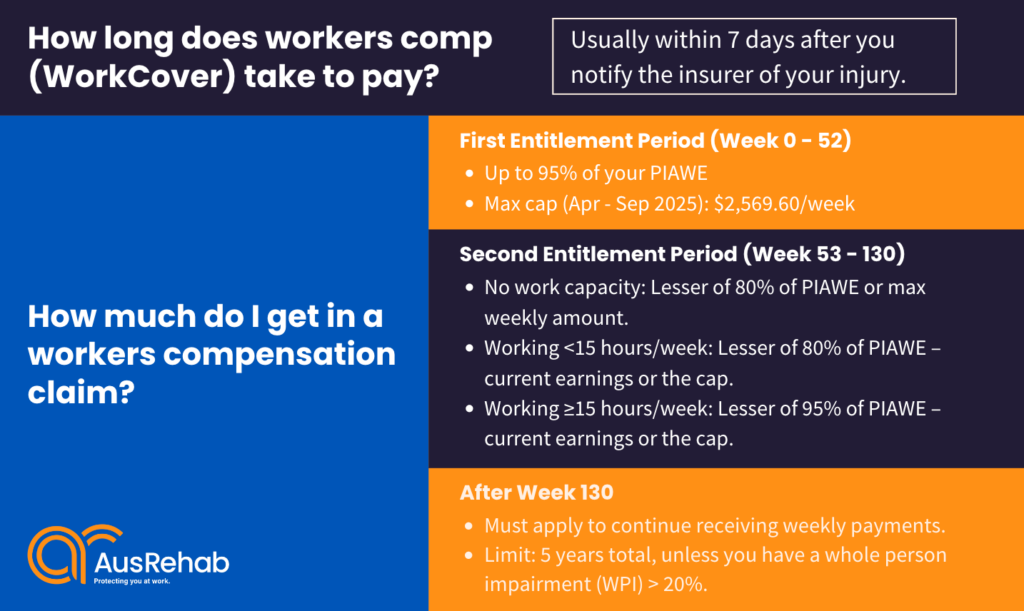Our Services
Resources
For Businesses
For Workers
Apr 23, 2025 • 7 min read
Wondering how long WorkCover takes to pay? Payments often start within 7 days. Find out how much you can get under the latest workers comp policies.

Written by: Ginny Cai
How long does your workers compensation take to pay? Straight answer: within seven days of injury notification. But how are these payments calculated, how much do you get, and how long do they actually last? This article unpacks SIRA’s Workers Compensation Benefits Guide, making sure you understand the rights and entitlements you deserve.
It usually takes a few days for your workers compensation claim to be approved. While your claim is being reviewed, you will receive provisional payments — a financial safety net provided even before your claim is formally approved.
The provisional payment is a weekly payment that can cover up to 12 weeks of pre-injury average weekly earnings (PIAWE) and up to $10,000 for reasonably necessary medical treatment. It provides financial support to injured workers while their workers compensation claim is being assessed to determine liability. But rest assured — workers compensation is a no-fault system, so you are entitled to all WorkCover benefits regardless of who was at fault, as long as the injury is work-related.
According to the SIRA guide, the insurer must commence provisional weekly payments within seven days of being notified of the injury, unless there is a reasonable excuse. Even if your claim is later declined, you won’t be required to repay any provisional payments received.
Workers compensation weekly payments can last for up to 130 weeks without needing a formal extension. In total, you may receive up to five years of payments, depending on your injury and circumstances.
The payment structure is split into three entitlement periods (more below), and your ongoing benefits are based on your PIAWE and work capacity. However, if you have an assessed permanent injury to your body, you may be eligible to receive workers comp payments until you reach the Commonwealth pension age.
Workers compensation (WorkCover) weekly payments aren’t one-size-fits-all — they vary depending on your entitlement period and work capacity.
During the first 52 weeks after your injury, you may receive up to 95% of your Pre-Injury Average Weekly Earnings (PIAWE). This includes regular wages, overtime, shift allowances, and non-monetary benefits (like accommodation or vehicle use).
As of 1 April to 30 September 2025, the maximum weekly compensation is capped at $2,569.60. This amount is reviewed and adjusted twice a year — on 1 April and 1 October.
After 52 weeks, your weekly payments depend on your current work capacity:

To continue receiving weekly payments beyond 130 weeks of your work injury, you must formally apply to the insurer. Ongoing payments are limited to a maximum of five years, unless you’re assessed with a permanent impairment of over 20%.
If you’re receiving weekly compensation payments under a workers compensation claim in NSW, it’s important to understand the situations that could lead to your payments being paused or reduced:
While navigating the complexities of a workers compensation case, your rehabilitation journey can feel overwhelming, and that’s where AusRehab steps in to support.
At AusRehab, our experienced consultants are here to guide you through each step. With a 90% return-to-work rate, our team helps you like a loyal friend — from understanding your entitlements to supporting your recovery journey.
Contact us today for a free consultation and let us help you move forward with confidence.
Want to Make a Change? Share with Anyone, Anywhere.
Don’t forget to share!

Resolve your work
place injury today
Be the first to know about our free training programs, videos, articles, and exclusive offers.

AusRehab acknowledges the Traditional Custodians of Country throughout Australia, recognising their deep ties to land, sea, and community.
We pay our respects to Elders past and present and extend our respect to all Aboriginal and Torres Strait Islander peoples today.
© 2025 AusRehab